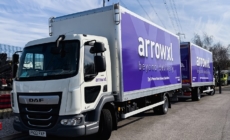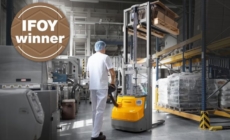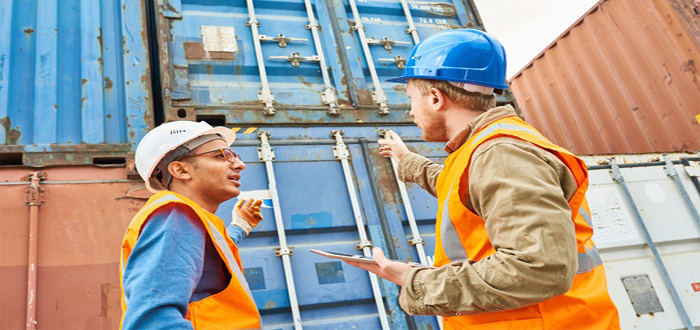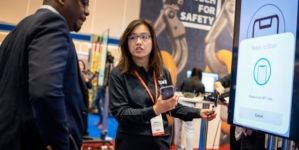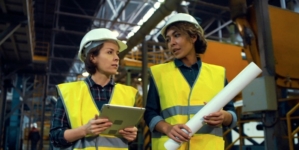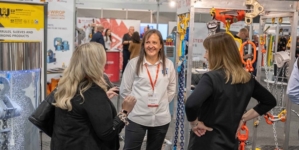-
ROSSLARE EUROPORT TARGETS HEALTH & SAFETY WITH CAMERA TELEMATICS PARTNERSHIP - 2 days ago
-
Landmark Study Reveals Wearable Robotics Significantly Boost Safety and Efficiency in Industrial Environments - July 24, 2024
-
Visku Tackle The Retail Seasonality Challenge One Pallet At A Time - July 22, 2024
-
KAMMAC AND BERGEN LOGISTICS STRENGTHEN FASHION & LIFESTYLE SERVICES IN THE UK - July 19, 2024
-
TENTBOX EXTENDS PARTNERSHIP WITH ARROWXL TO SUPPORT INCREASING DEMAND - July 17, 2024
-
The Perfume Shop improves customer journeys while driving profitability in partnership with Scurri - July 17, 2024
-
ZEROMISSION SECURES £2.3M ($3M) INVESTMENT TO ACCELERATE ELECTRIC FLEETS - July 16, 2024
-
BCMPA CELEBRATES SUCCESS OF 2024 CONFERENCE - July 15, 2024
-
Best of the Best: Jungheinrich Celebrates Triple International Award Win - July 12, 2024
-
GOPLASTICPALLETS.COM CALLS ON NEW CHANCELLOR RACHEL REEVES TO CONSIDER PLASTIC PACKAGING TAX REFORM - July 10, 2024
In the Future, Robots Will Help to Empty Sea Containers.
The Bremen Institute for Production und Logistics at the University of Bremen (BIBA), in collaboration with its development partners BLG Handelslogistik, Schulz Systemtechnik, and FRAMOS, is conducting research on the automated unloading of standard 40-foot containers, with the project, “Interactive Robotic System for Unloading of Sea Containers” (IRiS). In the future, intelligent robots will carry out this difficult and predominantly manual task, automatically. Germany’s Federal Ministry of Transport and Digital Infrastructure (BMVI) is funding the three-year project with 2.2 million euros; and, TÜV Rheinland is on- board as sponsor of the project.
The majority of all sea containers shipped worldwide are unloaded and discharged in the port, itself. These containers, with a capacity of 65 cubic meters (2295 cft) and a payload of 26 metric tons, can hold up to 1,800 parcels weighing up to 35 kg each. In today’s high-tech logistics chains, emptying these standard containers is one of the last remaining non-automated processes. The high level of complexity, and the challenging loading and unloading scenarios have made fully automated unloading impossible – until now. The objective of the IRiS project is to improve working conditions and make container handling operations at seaports more efficient. In the very near future, and without changes to the existing infrastructure, a mobile robot will be able to unload these sea containers independently, without manual intervention.
A Robot Analyzes and Unloads Containers with Artificial Intelligence and State-of-the-Art Image Processing
The robot will be equipped with an innovative grappling system, that will move autonomously between the gates and drive directly into the container. The robot, equipped with machine learning methods, will independently classify different packing scenarios and use this information to unload the containers in the best possible way. FRAMOS, a specialist in industrial image processing, is developing state-of-the-art methods for the IRiS project based on artificial intelligence, for the reliable classification of both packing scenarios and the analysis of container contents:
“Object recognition is based on 2D/3D image data. It uses state-of-the-art image processing and combines these with machine learning techniques, such as deep learning,” explains Dr. Simon Che’Rose, Head of Engineering at FRAMOS. “This allows the system to detect whether a container can be unloaded fully automatically, or whether manual control of the robot is required in special situations. The location and orientation of the contents are analyzed fully in advance, allowing optimum planning of the unloading process.”
Man-machine interfaces permit simple and agile interactions between robots and employees, in addition to the intuitive monitoring and control of one or more robots. Employees can monitor the robots from a control room at any time, and intervene quickly in the event of a malfunction, even without special programming knowledge. This task advantage minimizes the risk of costly system downtimes. A prototype of the IRiS project will be completed as early as 2019. It will demonstrate the innovative result of reliable cooperation between man and machine when it comes to unloading shipping containers. Therefore, all development partners of the IRiS project are focusing their efforts on relieving the strain on dockworkers, reducing unloading times, and maximizing handling capacity and efficiency.
Intelligent 3D Recognition Supports Innovative Applications in All Industries
The machine learning technology created by FRAMOS is based on self-learning 3D algorithms and innovative sensor technology; for example, the IRiS project employs Intel®’s latest RealSense™ technology. The 3D cameras, depth modules, and intelligent algorithms developed by FRAMOS can be transferred to a wide variety of scenarios in all industrial sectors. The detection, measurement, and analysis of scenarios and objects with artificial intelligence and 3D technology supports industrial automation and robotics, quality control, safety and surveillance. These advances are in addition to the innovative solutions in the fields of autonomous vehicles, drones, and novel consumer solutions provided by FRAMOS.






